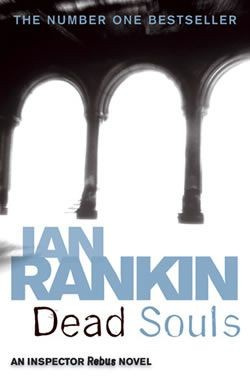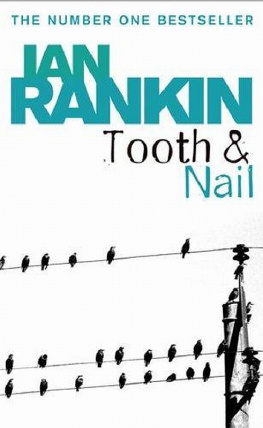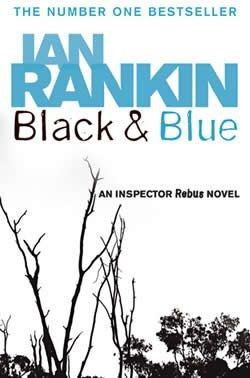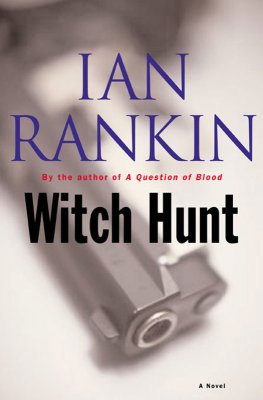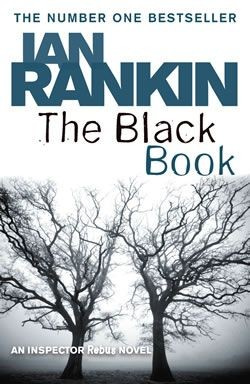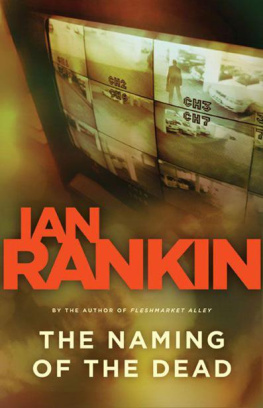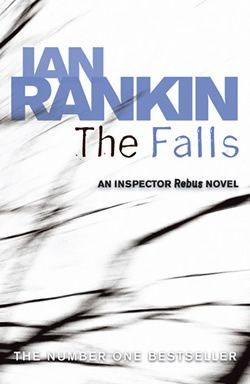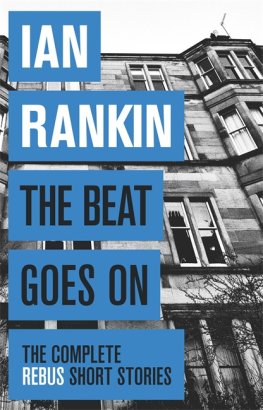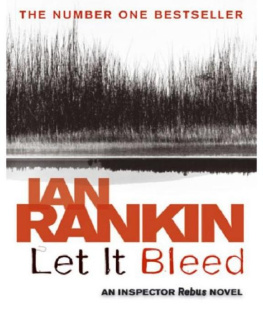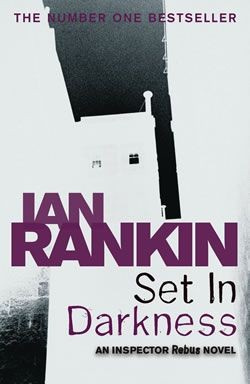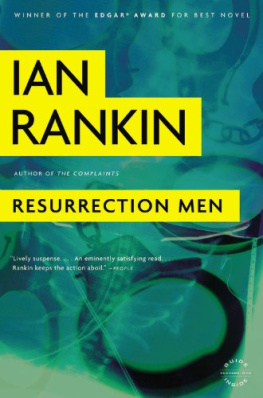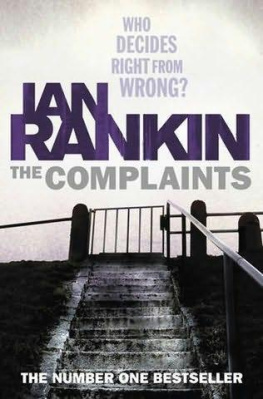Ian Rankin - Dead Souls
Here you can read online Ian Rankin - Dead Souls full text of the book (entire story) in english for free. Download pdf and epub, get meaning, cover and reviews about this ebook. year: 2008, publisher: Orion Books Limited, genre: Detective and thriller. Description of the work, (preface) as well as reviews are available. Best literature library LitArk.com created for fans of good reading and offers a wide selection of genres:
Romance novel
Science fiction
Adventure
Detective
Science
History
Home and family
Prose
Art
Politics
Computer
Non-fiction
Religion
Business
Children
Humor
Choose a favorite category and find really read worthwhile books. Enjoy immersion in the world of imagination, feel the emotions of the characters or learn something new for yourself, make an fascinating discovery.
- Book:Dead Souls
- Author:
- Publisher:Orion Books Limited
- Genre:
- Year:2008
- Rating:5 / 5
- Favourites:Add to favourites
- Your mark:
- 100
- 1
- 2
- 3
- 4
- 5
Dead Souls: summary, description and annotation
We offer to read an annotation, description, summary or preface (depends on what the author of the book "Dead Souls" wrote himself). If you haven't found the necessary information about the book — write in the comments, we will try to find it.
Dead Souls — read online for free the complete book (whole text) full work
Below is the text of the book, divided by pages. System saving the place of the last page read, allows you to conveniently read the book "Dead Souls" online for free, without having to search again every time where you left off. Put a bookmark, and you can go to the page where you finished reading at any time.
Font size:
Interval:
Bookmark:

Dead Souls
An Inspector Rebus Novel
IAN RANKIN
An Orion paperback
First published in Great Britain in 1999 by Orion
This paperback edition published in 1999 by Orion Books Ltd,
Orion House, 5 Upper St Martins Lane London WC2H 9EA
An Hachette UK company
Reissued 2008
Copyright (c) John Rebus Limited 199
Introduction copyright (c) John Rebus Limited 2005
The right of Ian Rankin to be identified as the author of this work has been asserted by him in accordance with the Copyright, Designs and Patents Act 1988.
All rights reserved. No part of this publication may be reproduced, stored in a retrieval system, or transmitted, in any form or by any means, electronic, mechanical, photocopying, recording or otherwise, without the prior permission of the copyright owner.
All the characters in this book are fictitious, and any resemblance to actual persons, living or dead, is purely coincidental.
A CIP catalogue record for this book is available from the British Library.
ISBN 978-0-7528-8362-5
Printed and bound in Great Britain by Clays Ltd, St Ives plc
The Orion Publishing Groups policy is to use papers that are natural, renewable and recyclable products and made from wood grown in sustainable forests. The logging and manufacturing processes are expected to conform to the environmental regulations of the country of origin
www.orionbooks.co.uk
To my long-suffering editor, Caroline Oakley
Contents
The world is full of missing persons, and their numbers increase all the time. The space they occupy lies somewhere between what we know about the ways of being alive and what we hear about the ways of being dead. They wander there, unaccompanied and unknowable, like shadows of people.
Andrew OHagan, The Missing
Once I caught a train to Cardenden by mistake ... When we reached Cardenden we got off and waited for the next train back to Edinburgh. I was very tired and if Cardenden had looked more promising, I think I would have simply stayed there. And if youve ever been to Cardenden youll know how bad things must have been.
Kate Atkinson, Behind the Scenes at the Museum
INTRODUCTION
Dead Souls was wholly conceived and written in Edinburgh - the first time this had happened since Rebuss initial outing in Knots & Crosses. The intervening novels had been written during my four-year stint in London, or else in the further six years spent in rural France. Now I was back in Edinburgh ... and worried that I would no longer be able to write about the place. This was a realistic fear, too: I had used geographical distance to help me recreate Edinburgh as a fictionalised city. How would I cope now that I could take a short stroll and see what Id been getting wrong all those years?
I neednt have worried.
Dead Souls is named after a song by Joy Division. As its title might suggest, its not a number you would dance to at weddings, unless you count the Addams Family among your in-laws. I was aware, of course, of Joy Divisions source material - the unfinished novel Dead Souls by Russian writer Nikolai Gogol. The phrase tortured genius might have been coined with Gogol in mind. Having published the first half of Dead Souls , he ended up burning the drafts of its second half. Later on, he started work on the book again, until his religious teacher persuaded him to renounce literature altogether. So the latest version of the second half went up in flames again, and Gogol died ten days later.
My own book is divided into two parts, entitled Lost and Found. Both begin with an italicised quotation from Gogols work, the one accompanying Found being the last words recorded by him. The title of the book came to me early. I knew I wanted to write about MisPers missing persons. I had become interested in them when doing research for Black & Blue. In a non-fiction work entitled The Missing (which I had read because it contained passages about the Bible John murders), journalist Andrew OHagan had discussed the phenomenon of loss and the hole left in the fabric of our lives when someone vanishes. Inspired by OHagans work, Id written a seventy-page novella called Death Is Not The End (itself a Bob Dylan title, but known to me through a contemporary reworking by Nick Cave). This novella had been written at the behest of an American publisher, who then seemed to find no immediate market for it. Worried that it might never see the light of day, I decided to cannibalise parts of the story for my next full-length novel - which is why two versions of the story exist, albeit with different outcomes.
Okay, so I was ready to rework my novella into a novel. But another real-life story had caught my eye in the interim. On a rough housing estate in Stirling, the locals had been roused by news that a convicted paedophile was living quietly in their midst. The vigilante instinct took over, and the man was chased out. Two things struck me about this. One was that it continued the theme Id touched on in my previous novel The Hanging Garden - namely, how do we begin to measure right and wrong? The other was that Rebuss knee-jerk reaction to news of a hidden paedophile would be the same as that of many people of his generation, class and philosophy: hed out the bugger, and damn the consequences. Well, Ive seldom shirked a challenge: I wanted to see if I could change his mind about a few things ...
I also wanted to take him home, back to where he grew up in central Fife. Although many of my books have had cause to send Rebus to Fife, Dead Souls is my most personal investigation of my own background. When high-school flame Janice reminisces with Rebus, she is using my own memories and anecdotes. We learn more, too, about Rebuss childhood, including that he was born in a pre-fab (as I was) but soon moved to a terraced house in a cul-de-sac (as I did). We find out that, like me, he drank in his home towns Goth pub (Goth being short for Gothenburg), and that his father brought a silk scarf back from World War II (as did mine). Much of this is reflected in the names I give to Rebuss school friends: Brian and Janice Mee. Theyre me, you see, as are characteristics of many of my other creations, Rebus chief among them.
There are plenty of in-jokes in the book, despite the sombre tone of its material. We meet Harry, the rudest barman in Edinburgh (who, in real life, is now landlord of the Oxford Bar and can afford to be rude only to a select few of us who expect no less of him). The nightclub in the book is called Gaitanos, after the American crime writer Nick Gaitano, who also wrote under his real name of Eugene Izzi. Hed been found dead shortly before I started work on the book, in what appeared, at least initially, to be mysterious circumstances. The headless coachman mentioned at the start of the book (and later on, as the name of a pub) is actually Major Weir, a real-life character from Edinburghs dark side. Weir and his sister were accused in 1678 of being warlock and witch. Both were eventually executed, despite having lived lives of exemplary piety, and with only the Majors rambling and befuddled confession as proof.
The modern equivalent of a witch-hunt? Look no further than the popular medias treatment of suspected paedophiles ...
Dead Souls was a landmark of sorts for me, being the first time I had allowed a charity to auction off the right for someone to appear as a character in one of my books. These days, I do this up to six times per book, but there was just the one instance in Dead Souls. The prize was won by a friend, but she didnt want the honour for herself. Oh no, she wanted it for another of her friends in the USA, a woman called Fern Bogot.
It doesnt sound very Scottish, I complained.
Next pageFont size:
Interval:
Bookmark:
Similar books «Dead Souls»
Look at similar books to Dead Souls. We have selected literature similar in name and meaning in the hope of providing readers with more options to find new, interesting, not yet read works.
Discussion, reviews of the book Dead Souls and just readers' own opinions. Leave your comments, write what you think about the work, its meaning or the main characters. Specify what exactly you liked and what you didn't like, and why you think so.

